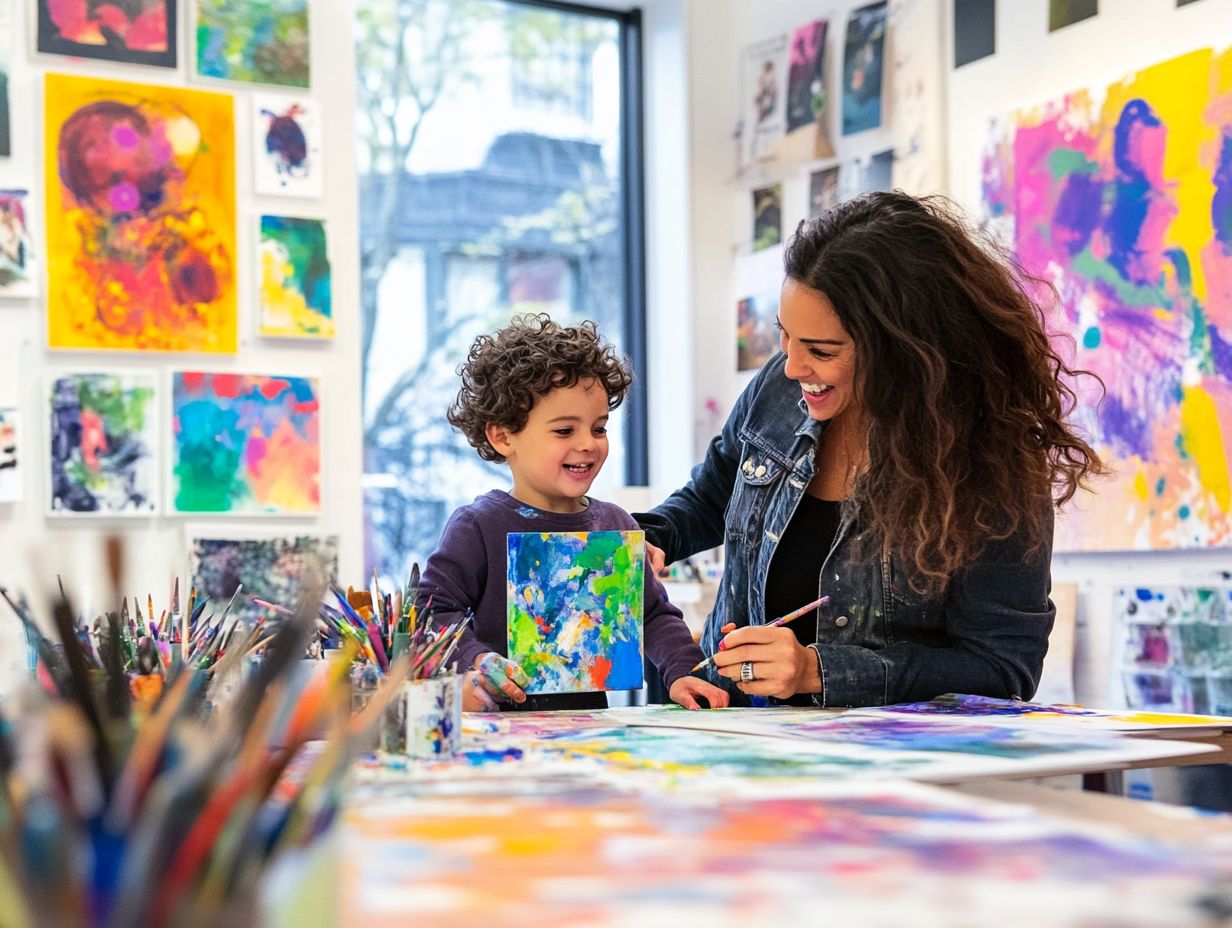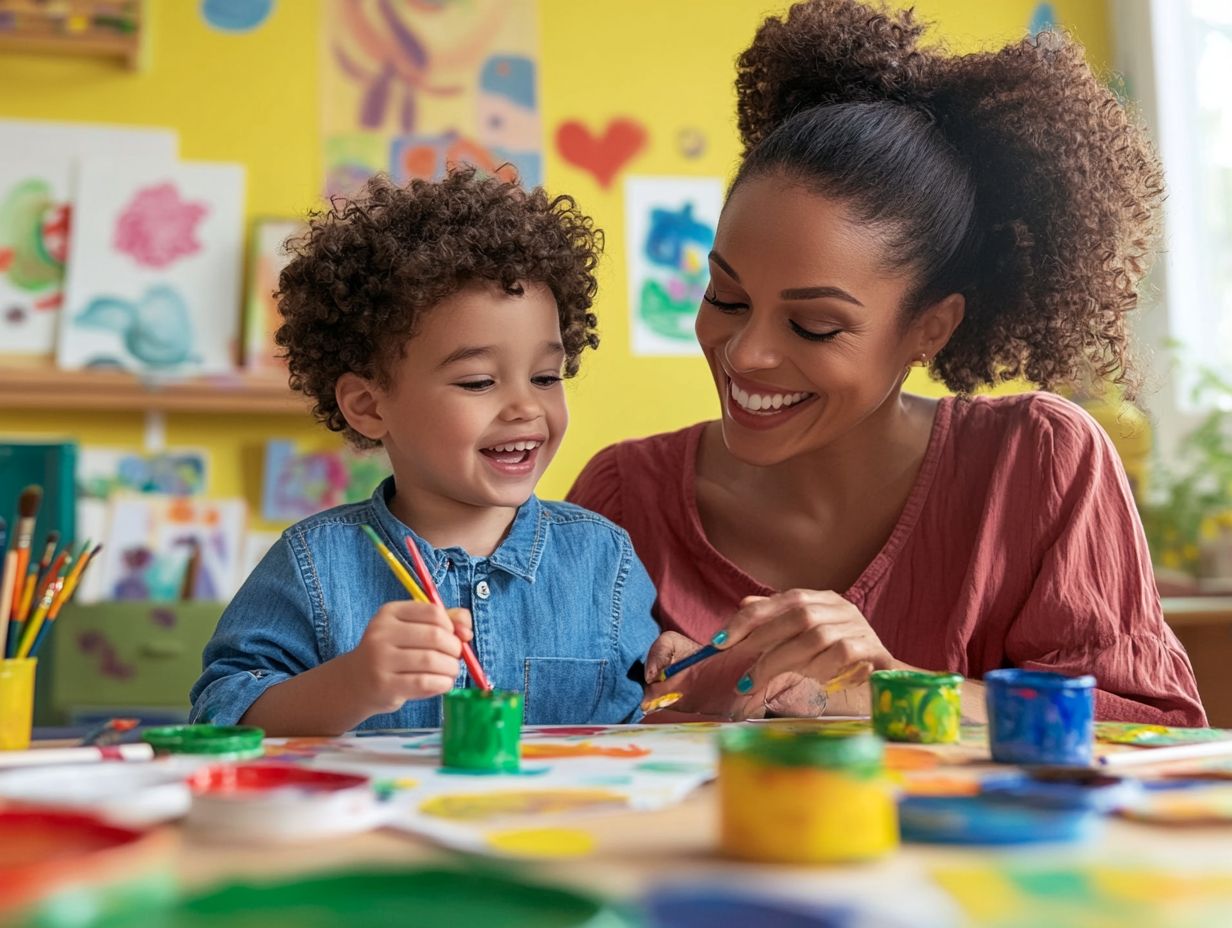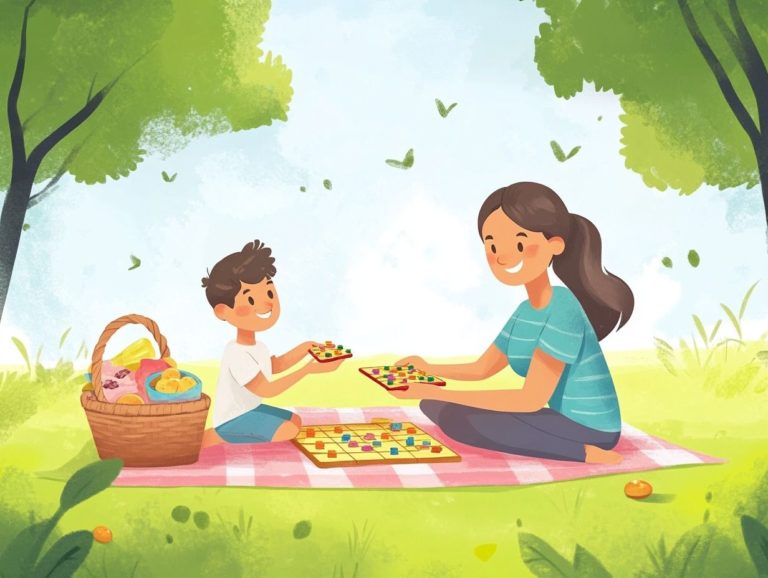5 Creative Ways to Bond with Your Child
Building a strong bond with your child is crucial for their emotional and social development, and it paves the way for creating lasting memories that you both will treasure. This parent-child relationship is foundational for your child’s growth and well-being.
Get ready to explore five fun and creative activities that will bring you closer to your child! Whether it s cooking and baking together, engaging in creative play, or embarking on nature walks, these engaging experiences can significantly enhance your relationship while supporting your child s development.
You will also discover insights into the importance of bonding, the myriad benefits it brings, and practical tips for maximizing your time together. Discover innovative ways to strengthen your connection with your child through meaningful interactions and attentive parenting! Don t wait! Start bonding with your child today through these exciting activities!
Contents
- Key Takeaways:
- 1. Create Art Together
- 2. Cook or Bake Together
- 3. Go on Nature Walks or Hikes
- 4. Have a Movie or Game Night
- 5. Volunteer Together
- Why Is Bonding with Your Child Important?
- Frequently Asked Questions
- Creative Ways to Bond with Your Child
- What are 5 creative ways to bond with my child?
- How can I use reference data to bond with my child?
- What are some benefits of bonding with my child through creative activities?
- How can I incorporate technology into creative bonding activities with my child?
- What if my child is not interested in or struggles with creative activities?
- How can I make bonding through creative activities a regular part of our routine?
Key Takeaways:

- Discover your child’s creative side by making art together. This activity encourages self-expression, boosts imagination, and strengthens your bond, fostering emotional development.
- Cooking or baking together is a fun and practical way to bond with your child. It teaches important life skills, promotes teamwork, and creates lasting memories while also introducing them to a healthy diet.
- Explore the great outdoors and bond with your child through nature walks or hikes. This activity promotes physical activity, appreciation for nature, and quality time together, encouraging child exploration and curiosity.
1. Create Art Together
Creating art together offers a delightful opportunity for you and your child to bond. This fosters a loving and supportive environment where emotional development can flourish through shared creativity and expression.
When you engage in artistic projects as a family, you’re not just spending quality time together; you’re nurturing your child s imagination, filling those moments with joy and laughter.
Whether it’s painting vibrant landscapes or drawing whimsical characters, these diverse art projects serve as a canvas for imagination, encouraging your child to express their thoughts and feelings without any fear of judgment. Working with materials like clay or recycled items can enhance this experience even further, as you collaborate to create something unique, reinforcing trust and respect.
By incorporating positive parenting techniques such as active listening and gentle guidance during these activities, you cultivate a nurturing environment that strengthens your relationships. This approach instills in your child the confidence to explore their creativity, fostering a sense of accomplishment and emotional resilience that will benefit them for years to come.
2. Cook or Bake Together
Cooking or baking together offers you a wonderful opportunity to spend quality time with your children, imparting valuable life lessons about nutrition, responsibility, and culinary skills while reinforcing cherished family traditions.
This shared activity not only nurtures emotional connections but also encourages your kids to explore their unique tastes and preferences, contributing significantly to their overall happiness and well-being.
Involving children in the kitchen can ignite their curiosity about various ingredients and flavors, making healthy eating habits more enticing. By assigning age-appropriate tasks whether it s stirring batter, measuring ingredients, or decorating cookies you give them the power, fostering their confidence and independence.
As they immerse themselves in the cooking process, you can seamlessly weave in open discussions about choosing nutritious foods, allowing you to respond to your child’s thoughts and preferences in a supportive manner. This collaborative cooking experience ultimately lays the groundwork for lifelong culinary skills and a deeper appreciation for the importance of wholesome meals.
3. Go on Nature Walks or Hikes
Embarking on nature walks or hikes offers you and your family a captivating way to connect. This allows your children to explore their environment.
This experience fosters a sense of independence and emotional resilience (the ability to cope with challenges and bounce back from setbacks) as they uncover the wonders of nature. These outdoor excursions not only enhance your child s growth and development but also promote physical health and strengthen relationships through shared adventures.
As your children navigate the trails, they will learn to appreciate the beauty around them while developing problem-solving skills and building confidence in their abilities. Engage them in child-centered activities like identifying local flora and fauna or setting up small challenges to further ignite their curiosity and creativity. These child-centered activities help in understanding their developmental needs and stages.
To ensure a safe and enjoyable outing, you can prepare by:
- Dressing your kids in appropriate attire
- Bringing plenty of water and snacks
- Discussing trail safety beforehand
This collaborative approach nurtures not only a love for the outdoors but also cultivates trust and mutual respect. By communicating openly during your explorations, each hike transforms into a meaningful bonding experience! It contributes to the development of healthy communication habits.
4. Have a Movie or Game Night

Having a movie or game night is a cherished family tradition that offers you and your loved ones a wonderful opportunity to connect, unwind, and enjoy each other s company in a fun and structured setting. These shared experiences foster open communication and attentiveness, enabling meaningful interactions that contribute to emotional security, child happiness, and healthy family routines while reinforcing those vital family bonds.
Choosing age-appropriate films or games is essential to ensure that every family member feels included and engaged. When you involve your children in the selection process, you not only give them the power but also heighten their excitement for the planned activity, respecting their personal space and preferences. This simple act of participation nurtures a deeper connection among you all.
To truly elevate these moments, creating a distraction-free environment is key. Silencing phones and minimizing interruptions allows everyone to dive fully into the experience. Such an atmosphere encourages laughter, discussion, and connection, ultimately turning family night into a treasured ritual that everyone eagerly anticipates! This practice ensures you enjoy every moment together!
5. Volunteer Together
Volunteering together as a family serves as a powerful way for fostering mutual respect and empathy while also instilling essential life skills in children that contribute to their emotional development and understanding of community. When you engage in shared activities that support others, your family creates strong bonds and connections, enhancing relationships and nurturing a caring environment for your child’s growth.
This collective experience allows your children to grasp the importance of giving back as they participate in various volunteering opportunities, such as maintaining community gardens, serving meals at local shelters, or organizing educational events for underprivileged youth. These experiences teach them to meet child needs empathetically.
These activities not only teach practical skills but also ignite insightful conversations about social issues, enriching your family discussions significantly.
As your children witness the impact of their contributions, they build emotional resilience and become more responsive individuals, equipped to understand and empathize with others. Ultimately, these shared efforts guide them toward becoming compassionate and responsible community members, laying a solid foundation for a life marked by kindness and service! This practice also promotes the development of healthy communication habits.
Why Is Bonding with Your Child Important?
Renowned organizations such as UNICEF emphasize the importance of parental bonding in childhood development.
Bonding with your child is essential for their emotional development and overall happiness. It establishes a foundation of trust and security that fosters healthy relationships throughout their lives. By engaging in meaningful interactions, you enhance your child’s emotional resilience and nurture their ability to form supportive connections with others. This equips them with the essential social skills that benefit their personal and emotional well-being. Parenting tips from experts like Jessica Robinson and Paige Dorn can be valuable in understanding the best practices for building these bonds.
To ensure that these connections are strong, consider various parenting styles that prioritize nurturing and supportive environments. Approaches that emphasize active listening, consistent nurturing, and positive reinforcement can significantly bolster the sense of security your child feels. Incorporating age-appropriate consequences and surprising gifts can also strengthen the parent-child relationship.
When you create spaces for open dialogue and emotional expression, your child is more likely to develop healthy attachments and a robust sense of self-worth. This nurturing environment is essential for their childhood development and emotional resilience.
These early connections lay the groundwork for their interactions with peers and other adults, ultimately influencing their emotional intelligence and ability to navigate complex relationships in adulthood. Family Services organizations like those in Northeast Wisconsin and resources like Family Education and Parenting Class can offer additional support in this journey.
What Are the Benefits of Bonding with Your Child?
Programs like Dolly Parton s Imagination Library highlight the importance of early bonding experiences in childhood development.
The benefits of bonding with your child are profound and multifaceted, offering emotional security, improved communication, and enhanced growth that create a loving atmosphere that helps them be happy throughout their lives. By reinforcing family traditions and engaging in shared activities, you can foster a sense of belonging and self-esteem in your children, which is crucial for their overall development.
Quality time and individual time spent together are vital components of these bonding moments. A nurturing atmosphere cultivates emotional resilience, empowering your children to navigate challenges with greater ease as they grow. Consistent interactions help them develop better communication skills, allowing them to express themselves openly and appreciate diverse perspectives.
Establishing supportive relationships through bonding activities lays the foundation for strong social networks, teaching your children the importance of empathy, listening, and cooperation. These benefits enrich the parent-child relationship. They ensure children grow up in a stable environment where they feel valued and understood, having their developmental needs met ultimately shaping their character and how they engage with the world around them.
How Can Bonding Activities Help with Child Development?

Bonding activities are essential in child development, addressing emotional needs and promoting positive parenting techniques that nurture a child s ability to flourish in a supportive environment. Through shared experiences, you help children acquire vital life skills, emotional resilience, and the capacity for independent play, which means playing alone or with minimal supervision, is vital for a child’s creativity all contributing to their overall growth, happiness, and emotional security.
Engaging in activities like storytelling, playtime, or even cooking together fosters a secure attachment that profoundly influences your child’s emotional landscape. These moments not only build trust but also encourage the development of social skills, as children learn to communicate and cooperate with others.
Responsive parenting during these interactions is crucial. By demonstrating attentiveness, understanding, and loving affection, you effectively validate your child’s feelings, which reinforces their emotional development. Such interactions lay the groundwork for healthy relationships in the future, equipping children with the skills to navigate complex social environments while fostering a balance between independence and interdependence.
Are you ready to bond with your child? Start incorporating bonding activities today to strengthen your relationship with your child!
What Are Some Other Creative Ways to Bond with Your Child?
You have a wealth of creative opportunities to bond with your child, which can foster meaningful interactions and elevate your parent-child relationship. From simple daily routines to engaging, child-centered activities, you can ignite their imagination and joy.
Think about incorporating storytelling, building projects, or imaginative play. Each of these contributes to a supportive atmosphere that helps your child grow and feel secure.
Beyond these delightful pastimes, you can seamlessly weave diverse bonding opportunities into your everyday life. Nature walks offer a chance for your child to explore the outdoors while learning about the environment. Meanwhile, family game nights promote teamwork and healthy competition.
Gardening is another wonderful avenue, allowing your child to connect with nature and appreciate the rewards of nurturing living things. If music is your family’s passion, consider hosting family jam sessions to develop rhythm and creativity together, fostering a healthy environment.
Feel free to adapt these activities based on your child s interests or developmental stages, ensuring each experience remains enjoyable and enriching.
How Can Parents Make Time for Bonding Activities?
Making time for bonding activities is crucial for cultivating a strong parent-child relationship and ensuring quality time. Yet, it often demands intentional planning amid the distractions of daily life.
By prioritizing family routines and carving out dedicated time for connection, you can create a nurturing environment that nurtures emotional development and enriches the quality of time spent together.
To seamlessly incorporate these moments, consider scheduling regular family nights whether that means a weekly game night, a movie marathon, or cooking dinner together. These fun experiences create excitement and keep everyone looking forward to family time.
Weaving short, meaningful interactions into your daily routine, like sharing morning snacks, surprise gifts, or enjoying evening strolls, can strengthen your connections without feeling overwhelming.
During these special times, it s vital to minimize distractions. Put away the phones and turn off the TV to enhance engagement and truly savor one another s company. This focused attention will deepen emotional ties and create a safe space for open communication, fostering nurturing relationships.
What Are Some Tips for Building a Strong Bond with Your Child?
Building a strong bond with your child requires a thoughtful blend of responsive parenting, attentive listening, and engaging in activities that nurture relationships centered on trust and love. Maintaining mutual respect and setting boundaries ensures a balance between personal space and connection moments.
By adopting effective communication habits and being fully present during your interactions, you can create a secure emotional environment that encourages your child’s growth and exploration.
To deepen this connection, it is crucial for you to practice active listening, demonstrating genuine interest in your child’s thoughts and feelings. Sharing activities that you both enjoy whether it’s cooking, reading, or embarking on outdoor adventures can significantly strengthen your relationship.
Regularly expressing affection, whether through heartfelt words or physical gestures, reinforces that vital emotional bond. Establishing a foundation of mutual respect paves the way for healthy discussions about boundaries, age-appropriate consequences, and structure and guidance, helping your child grasp the significance of their actions.
By taking these steps, you not only cultivate a healthy parent-child dynamic but also foster resilience, self-esteem, and emotional development within your child.
Frequently Asked Questions

Start these bonding activities today! Your relationship with your child will flourish.
Creative Ways to Bond with Your Child
What are 5 creative ways to bond with my child?
1. Take a nature walk and collect items to create a nature collage together.
2. Bake and decorate cookies with your child, using fun and colorful ingredients.
3. Plan a family movie night. Have each family member take turns choosing the movie.
4. Create a scavenger hunt with clues and tasks that require teamwork and problem-solving.
5. Make a time capsule together, including items and memories that represent your current lives.
How can I use reference data to bond with my child?
You can use reference data to teach your child new skills, such as counting, sorting, and identifying shapes and colors.
These activities support early years education and childhood development.
You can also use reference data to start conversations about various topics, such as animals, plants, or historical events.
What are some benefits of bonding with my child through creative activities?
Bonding with your child through creative activities strengthens your relationship and promotes their cognitive, emotional, and social development.
It supports positive parenting. You ll see your child learn problem-solving skills while having fun!
How can I incorporate technology into creative bonding activities with my child?
You can use technology to create and share digital artwork, play interactive educational games, or create a digital scrapbook of your family memories.
Just make sure to set boundaries and monitor screen time to maintain a healthy balance.
What if my child is not interested in or struggles with creative activities?
It’s important to find activities that your child enjoys and feels confident about. Engaging in child-centered activities ensures their happiness and growth.
Don’t force them to participate in activities they don’t enjoy. Instead, explore different options and find what works best for both of you.
You can also seek guidance from a child development specialist if your child is struggling in certain areas.
How can I make bonding through creative activities a regular part of our routine?
Set aside dedicated time each week for bonding through creative activities. Make sure to include individual time for each child.
It can be a specific day or time, or you can incorporate it into your daily routine, such as during meals or before bedtime.
Making it a regular part of your routine will help strengthen your bond and create lasting memories with your child.
Don’t wait! Start these creative activities today and strengthen your bond with your child.






